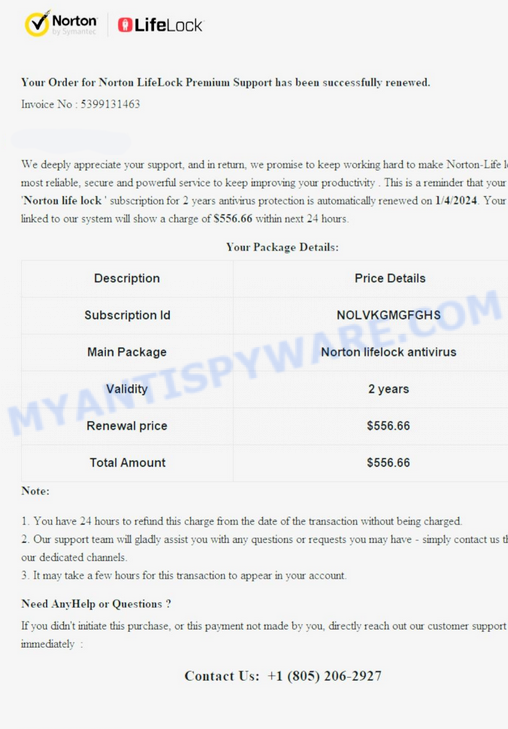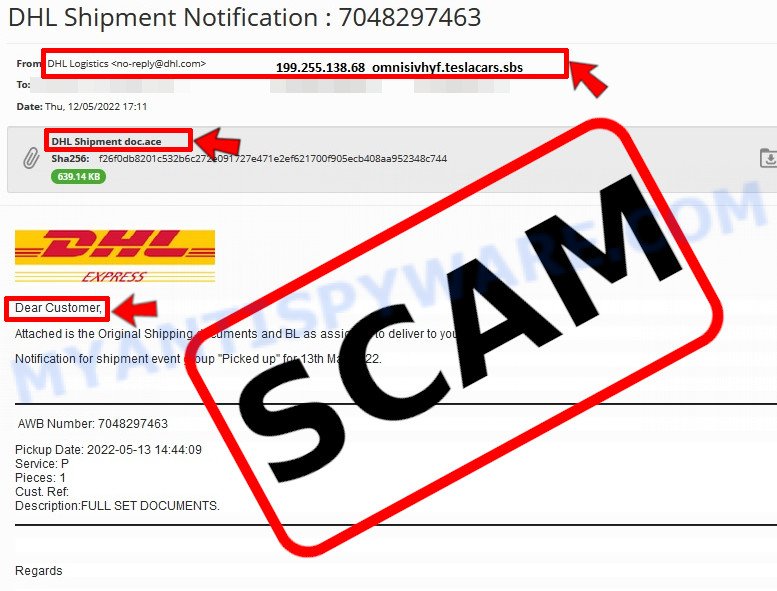Have you recently received an email claiming that your Norton LifeLock subscription has been automatically renewed for a hefty amount, like $556.66, and you should contact their support if you didn’t authorize this?

Question: Is this email from Norton LifeLock real or is it a scam trying to get my personal information and money?
Investigation Findings: This email is part of a scam aimed at tricking you into contacting a fake customer support number where scammers will try to get your personal and financial information or persuade you to make unnecessary payments.
Answer: The “Norton Lifelock Renewal” email is a fraudulent email. 💡 To protect yourself from scams like this, always double-check any unexpected charges with the official company’s website or their verified contact information. Do not call phone numbers or click on links provided in suspicious emails. Additionally, report such emails to your email provider and mark them as spam.
A typical “Norton Lifelock Renewal” scam email reads as follows:
Norton
LifeLock
Your Order for Norton LifeLock Premium Support has been successfully renewed.
Invoice No 5399131463
We deeply appreciate your support, and in return, we promise to keep working hard to make Norton-Life Is most reliable, secure and powerful service to keep improving your productivity. This is a reminder that your Norton life lock subscription for 2 years antivirus protection is automatically renewed on 1/4/2024. Your linked to our system will show a charge of 5556.66 within next 24 hours
Your Package Details:
Description
Price Details
Subscription Id
NOLVKGMGFGHS
Main Package
Norton lifelock antivirus
Validity
2 years
Renewal price
$556.66
Total Amount
$556.66
Note:
1. You have 24 hours to refund this charge from the date of the transaction without being charged
2. Our support team will gladly assist you with any questions or requests you may have simply contact us th our dedicated channels
3. It may take a few hours for this transaction to appear in your account
Need Any Help or Questions?
If you didn’t initiate this purchase, or this payment not made by you, directly reach out our customer support immediately
Contact Us: +1 (805) 206-2927
The Norton Lifelock Renewal Email Scam is a sneaky trick that targets people by pretending to be a legitimate renewal notification. This scam sends an email claiming that your Norton Lifelock subscription has been auto-renewed, and that your account will soon be charged a large sum of money. The email also includes fake invoice details and a customer support phone number. Scammers use this tactic to trick people into calling the fake support number, where they might try to steal your personal information or payment details.
These scam emails often come with errors in grammar and format, making them seem a bit off. Scammers use these tricks to cause panic and make you act without thinking. If you call them, they might ask for more information or try to get you to pay for a service you didn’t buy.
💡 If you receive this type of email, don’t contact the numbers provided or click on any links. Instead, delete the email and check your Norton account directly if you’re worried about your subscription. Make sure to report the scam email to Norton and your email provider to help stop these scams from spreading.
Summary Table
| Name | Norton Lifelock Renewal Email Scam |
| Type | Email Scam |
| Target | Individuals using email |
| Scam Techniques | Fake subscription renewal notice, fake invoice, contact number for “support” |
| Contact Information Given | +1 (805) 206-2927 |
| Warning Signs | Unrecognized billing, urging to contact support, large fee without prior notice |
📧 What to Do When You Receive the “Norton Lifelock Renewal” Scam Email
We advise everyone who receives this email to follow the simple steps below to protect yourself from potential scams:
- ❌ Do not believe this email.
- 🔒 NEVER share your personal information and login credentials.
- 📎 Do not open unverified email attachments.
- 🚫 If there’s a link in the scam email, do not click it.
- 🔍 Do not enter your login credentials before examining the URL.
- 📣 Report the scam email to the FTC at www.ftc.gov.
If you accidentally click a phishing link or button in the “Norton Lifelock Renewal” Email, suspect that your computer is infected with malware, or simply want to scan your computer for threats, use one of the free malware removal tools. Additionally, consider taking the following steps:
- 🔑 Change your passwords: Update passwords for your email, banking, and other important accounts.
- 🛡️ Enable two-factor authentication (2FA): Add an extra layer of security to your accounts.
- 📞 Contact your financial institutions: Inform them of any suspicious activity.
- 🔄 Monitor your accounts: Keep an eye on your bank statements and credit reports for any unusual activity.
🔍 How to Spot a Phishing Email
Phishing emails often share common characteristics; they are designed to trick victims into clicking on a phishing link or opening a malicious attachment. By recognizing these signs, you can detect phishing emails and prevent identity theft:

💡 Here Are Some Ways to Recognize a Phishing Email
- ✉️ Inconsistencies in Email Addresses: The most obvious way to spot a scam email is by finding inconsistencies in email addresses and domain names. If the email claims to be from a reputable company, like Amazon or PayPal, but is sent from a public email domain such as “gmail.com”, it’s probably a scam.
- 🔠 Misspelled Domain Names: Look carefully for any subtle misspellings in the domain name, such as “arnazon.com” where the “m” is replaced by “rn,” or “paypa1.com,” where the “l” is replaced by “1.” These are common tricks used by scammers.
- 👋 Generic Greetings: If the email starts with a generic “Dear Customer”, “Dear Sir”, or “Dear Madam”, it may not be from your actual shopping site or bank.
- 🔗 Suspicious Links: If you suspect an email may be a scam, do not click on any links. Instead, hover over the link without clicking to see the actual URL in a small popup. This works for both image links and text links.
- 📎 Unexpected Attachments: Email attachments should always be verified before opening. Scan any attachments for viruses, especially if they have unfamiliar extensions or are commonly associated with malware (e.g., .zip, .exe, .scr).
- ⏰ Sense of Urgency: Creating a false sense of urgency is a common tactic in phishing emails. Be wary of emails that claim you must act immediately by calling, opening an attachment, or clicking a link.
- 📝 Spelling and Grammar Errors: Many phishing emails contain spelling mistakes or grammatical errors. Professional companies usually proofread their communications carefully.
- 🔒 Requests for Sensitive Information: Legitimate organizations typically do not ask for sensitive information (like passwords or Social Security numbers) via email.
✅ Conclusion
We hope this article has helped you understand more about the “Norton Lifelock Renewal” Scam Email and how to avoid falling victim to scammers. If you have received a phishing email that is similar but not identical to the example above, please post it in the comments section of this article. This helps us warn other users about potential scams and improve our resources to protect you better. Stay safe and vigilant! 🛡️















